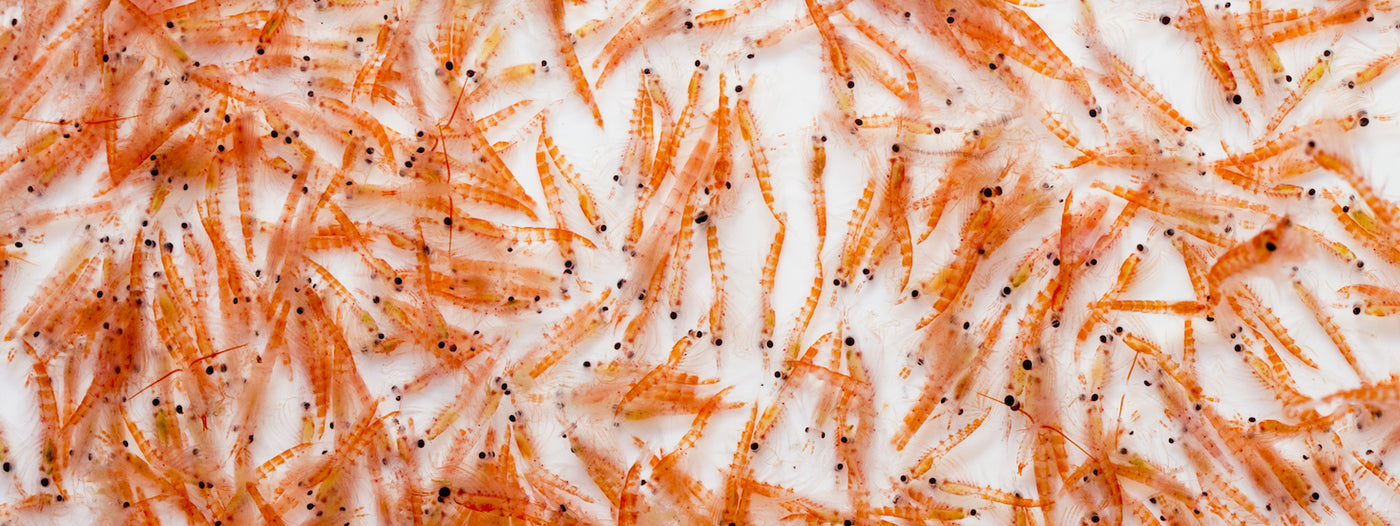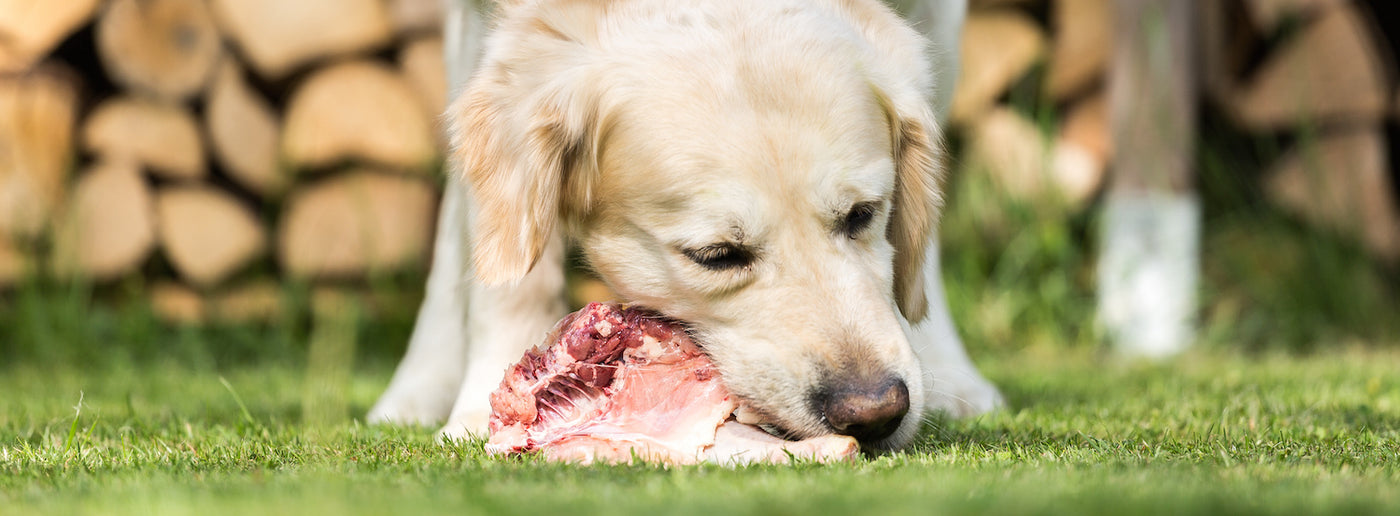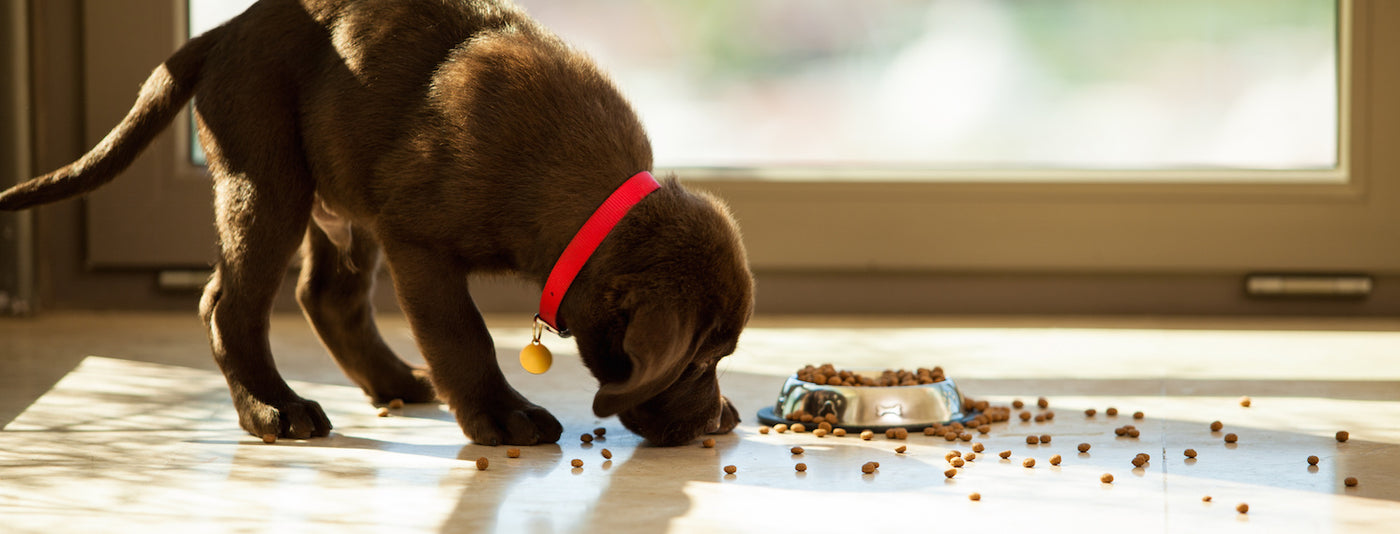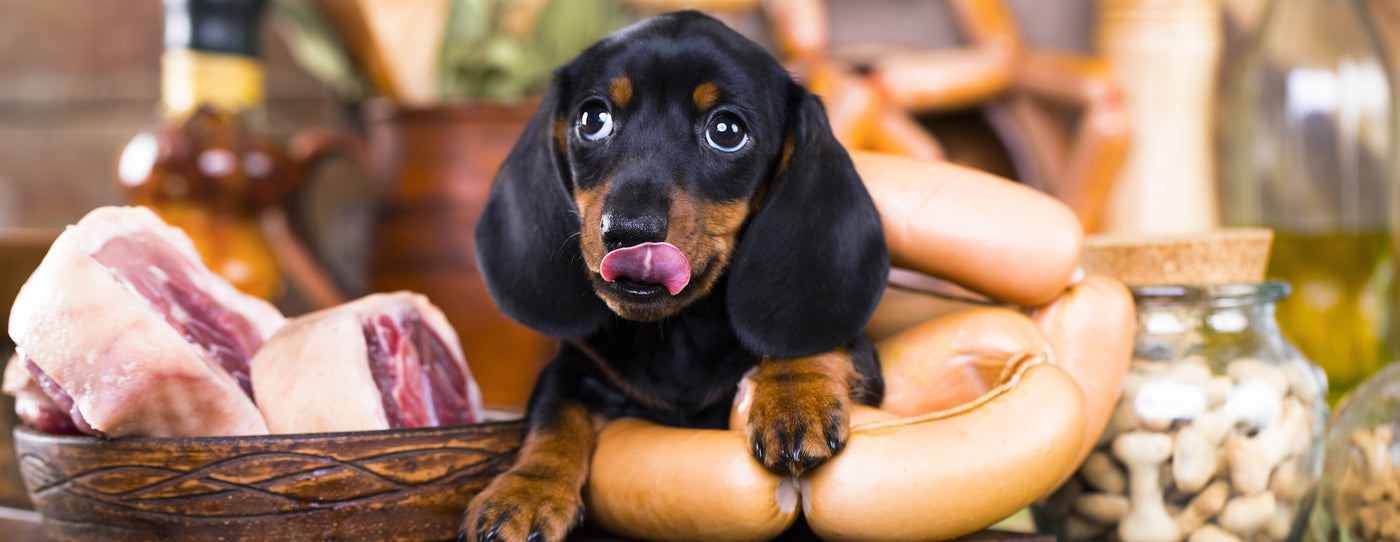News

4 reasons to introduce krill to your dog’s diet
Ever wondered how the world’s largest mammal is able to survive on krill alone? That’s because Krill, is in actual fact a superfood - and one that is perfectly suited to man’s best friend.
For those needing a little convincing on introducing shellfish to your dog’s diet, we’ve listed 4 very convincing reasons that are worth considering before dismissing this quite substantial superfood.
- Krill oil contains more digestible omega-3 fatty acids than any other fish oil. While helping to maintain the elasticity of cells, omega-3 is also well known for reducing inflammation and lowering high blood lipid levels.
- Krill provides quality protein, as well as numerous vitamins, micronutrients, amino acids and minerals (from A to zinc).
- Krill contains glucosamine - an important component for the healthy growth, development and maintenance of cartilage tissue and joints.
- Krill contains a high quantity of astaxanthin, a natural carotenoid similar to that found in carrots and tomatoes. Astaxanthin is actually responsible for fighting free radicals in the body that cause cells to age and weaken the immune system.
Step away from the high-street brands
It’s important, as a dog owner, to remember that the dog foods available on supermarket shelves aren’t the only options available. In fact, many of these products aren’t satisfying your dog’s nutritional needs - you only have to investigate the ingredients label to confirm this.
However, we’re continuously searching for brands that are heavily committed to producing quality, nutritional dog foods capable of keeping our furry companions in optimum health. The newest brand introduced to our product range is Belcando - an innovative provider of quality, forward-thinking foods containing everything your dog could possibly need, and more.
You'll also be pleased to learn that Belando specialises in food for dog's of all ages, regardless of sensitivities. Shop the full Belcando range here today.
- Ben Abimbola
- Tags: Dog Diet Dog Food Dog Health Dog Nutrition Krill

Keep your dog healthy this spring
Every dog loves Springtime - we’re talking longer walks and scurrying around in Spring flowers. And while this much welcomed season has so many upsides, enjoying the great outdoors can pose health risks to our beloved dogs. That’s why we’ve put together some general health care tips on keeping your dog healthy and happy this Spring.
Flea and tick prevention
One of the very few downsides to Spring? It’s flea and tick season and time to get using those flea and tick prevention treatments. Double check the label of the product you choose to apply, some contain toxic ingredients. We can highly recommend VETiONX. Be sure to groom your pooch regularly and bathe him or her as often as you feel they need it - a lot of outdoor time often comes with its fair share of dirt.
Deworming
We would always do this year round, but if you haven’t, now’s the time to treat your pooch. If he or she goes untreated throughout the outdoor season, they could become infected should they ingest something they shouldn’t. Speak to your vet if you’re unsure of how to treat your dog.
Gardening and Flowers
Some flowers, including lilies, daffodils and tulips are highly toxic to both cats and dogs and can even be fatal. Be mindful of the flowers you bring into your home or garden this Spring and Summer. Also, if you’re thinking of treating your lawn, opt for a product that’s pet-safe.
Cars
Yes, we have to mention it. We all know dogs shouldn’t be kept in cars during the warmer months as they can overheat very quickly and become extremely unwell if not worse. Please, please, please, avoid keeping your beloved pet in a hot car, it’s just not good for their health and can even land you a pretty hefty fine.
Hydration
That leads us on to the topic of fresh water! Ensuring your pooch and cat for that matter has constant access to fresh water at all times is incredibly important. They can’t tell you when they’re thirsty, so ensuring its always available is essential to their health and wellbeing.
Easter eggs and chocolates
Springtime brings its fair share of goodies, but keep them stored away well out of your pet’s reach. Why? Chocolate contains Theobromine, an ingredient that is incredibly toxic for dogs, causing possible vomiting, diarrhoea, seizures, tremors and even fatalities in some cases.
Thinking of switching your dog’s food?
If you’ve been thinking of switching your dog’s food, maybe to one of our natural premium dog foods, now’s the time to do it. Just like us humans, dogs tend to be even more active during Spring and Summer, meaning they’ll need as much energy as possible from the food they’re consuming.
Switching your dog’s food completely in one go can cause them to have an upset tummy, so it’s best to do it gradually by mixing the new food with their current food - increasing the amount gradually over time. The treats you give your dog are also important too - we stock a whole range of healthy, high-energy dog treats that are guaranteed to keep your dog’s energy fuelled.
- Ben Abimbola
- Tags: Dog Health Spring

How to tell if your dog is allergic to their food
It can often be difficult to pinpoint whether your dog is allergic to a certain ingredient in their food or whether the symptoms they’re experiencing are from something else i.e. the environment., If however, your dog is experiencing some unpleasant and prolonged symptoms that don’t seem to be budging, your vet will be able to run some tests to get to the exact route of the problem. It’s often helpful to know which symptoms to look out for, so we’ve listed the main ones below.
Symptoms to look out for:
- Upset stomach; wind, diarrhoea and/or vomiting
- Unhealthy skin; this could be flaky and dry, itchy or even oozing
- Unhealthy coat; patchy and/or bare in places or even dry
- Frequent sneezing or a runny nose
- Irritating ears, nose or eyes
- Swollen, irritable feet that they regularly lick or bite
Caring for a dog with food allergies
While some dogs are allergic to certain meat types, others are allergic to grains. We’d usually advise seeking vet advice prior to switching foods, however if the vet is unable to pinpoint exactly what ingredient they’re allergic to, the next best option is to try different food types and closely monitor your dogs reaction. If certain meats aggregate them, switch to a new one. If it’s the grains, switch to grain-free. There’s plenty of foods especially catered to dogs with allergies, from Imperial Food, through to Smolke. Many of our customers opt for hypoallergenic foods, avoiding things like wheat, soy, corn, additives and other problem-causing ingredients.
What if it's the environment?
Sadly, if your dog is allergic to something in the environment, its just a case of managing his or her symptoms. The best thing to do would be to bathe him/her every couple of weeks with a medicated shampoo, which will help to relieve the discomfort they may be in.
Foods we recommend for dogs with allergies or sensitive digestion:
- Smolke Grain-Free for adults
- Smolke Grain-Free for puppies
- Smolke Sensitive
- ImperialFood 1st Class
- ImperialFood StarFish
- Naturis Freshly Steamed Meat
Shop our complete food range today - you won't be disappointed...
- Ben Abimbola
- Tags: BARF diet Dog Allergy Dog Food Dog Health Dog Nutrition Hypoallergenic

Protein - Is your dog getting enough?
One of the most essential ingredients to your dog’s diet is of course protein. Whether from meat, fish, eggs and some plant matter, your dog needs protein in order to thrive. Why? Protein based foods help to support healthy development, which is particularly important for growing pups.
From muscle tone and bone strength, through to the functioning of nerves and even the condition of a dog’s coat, are all things supported by foods rich in protein.
And while most dogs love to run around, that energy is fuelled by protein. If your pooch is lacking meat from their life, you’ll notice a lack of energy, insufficient body weight and a poor coat - just to name a few symptoms. Of course, meat isn’t the only ingredient a dog will thrive from, but protein should make up a large part of their meal and if it doesn’t - it could be time for a change.
Wondering where to start? Changing your dog’s food immediately can sometimes upset their tummies. If you’re thinking of changing their food, try to do so gradually, introducing more of the new food each meal time, gradually replacing the old food.
When it comes to choosing a new food, sometimes the labels can be slightly bare in terms of specifying exactly how much of one food type exists in the packet. If this is the case, remember that ingredients will be listed largest to smallest, so we’d expect meat to be at the very top of that list. You’ll probably find that many dog foods found in supermarkets are filled with processed, cheap or insufficient protein sources that aren’t good enough to keep your dog in great health.
Here at Pooch DVD, we only stock the very best products for pets - you’ll notice the ‘Recommended by Pooch DVD’ stamp on all of the brands that we feature. That’s because we take pet health seriously and support other like-minded brands that do too.
Browse our best-selling food section to see what our fellow dog-owners love!
- Ben Abimbola
- Tags: BARF diet Dog Food Dog Health Dog meat Dog Nutrition Protein

Cereals and grains - Good or bad for our dogs?
As dog owners, we’re becoming more and more aware about exactly what it is we’re putting into their bodies and whether or not their nutritional demands are being satisfied by the very food we spend our hard earned money on. One question we get asked a lot here at Pooch DVD is whether or not we should be avoiding pet food containing cereals and grains and whether they’re damaging to our pet’s health.
Firstly, cereals and grains refers to anything from wheat, rice and barley through to oats and maize - all of which tend to be the usual accompaniment to the meats you’d expect to find in pet food. But are they good or bad?
Anyone that knows us here at Pooch DVD will know that we’re big supporters of protein based diets for dogs. After all, canine bodies flourish when fed nutritional, high energy meats. We’re not supporters of the processed pet foods found in most supermarkets - these are by no means beneficial to your much loved pet. You’ll probably find that brands whose pet food contains cereals and grains haven’t done so for your dog’s nutritional benefit - instead they’re there to act as a cheap filler, to make your dog’s tummy feel fuller and to ultimately increase their profits.
Just like us humans, every dog and the way in which their body reacts to food, is unique. Some dogs may have sensitive tummies that aren’t able to easily digest certain cereals and grains, while other dogs may well be able to. Grains and cereals may not necessarily be damaging to your pet’s health, but if the food in which your pet is eating has substituted healthy ingredients for more filling material, this could pose a health problem later down the line. It’s also worth noting that if you notice that your dog is producing unhealthy stools or their skin/coat is looking unhealthy, opting for grain-free pet food such as Smolke can often work wonders.
- Ben Abimbola
- Tags: BARF diet Cereals & grains Dog Food Dog Health Dog Nutrition

What vitamins does your dog need and why?
We humans know that our bodies need vitamins in order to grow, build immunity and repair themselves - and the exact same applies for dogs. Given the amount of physical activities that the majority of dogs will go through on a daily basis, a healthy and balanced diet that's packed with all of the necessary vitamins and nutrients, will enable your dog to live a long, healthy and happy life.
And while there’s a whole list of vitamins your pooch will benefit from, it’s important to keep vitamin consumption to a healthy limit, as exceeding the required amount of any one particular vitamin can be very harmful.
So what vitamins do dogs especially need and why? Here’s a quick snapshot:
Vitamin A - Contributing towards a dog’s skin, vision, immune system and iron metabolism.
B Vitamins - Functioning in lots of different ways, the B vitamins are crucial to help energise and repair a dog’s body.
Vitamin C - Performing as an antioxidant, vitamin C acts as an internal cleanser and can help to reduce inflammation.
Vitamin D - Contributing towards healthy bone and muscle development, which every dog depends on.
Vitamin E - Great for sustaining healthy skin and eyes, as well as strengthening a dog’s immune system and natural defences against illness and infection.
At Pooch DVD, we know how difficult it can be to ensure your dog’s getting exactly what he or she needs from her food, and often, supermarket bought food isn’t doing your dog’s health any justice. That’s precisely why we’ve teamed up with leading dog food and dog health brands to deliver quality products that are specifically designed to boost a dog’s health, performance and ultimately their life span.
From healthy food options and treats through to vitamins and supplements - shop the full range at Pooch DVD today!
- Ben Abimbola